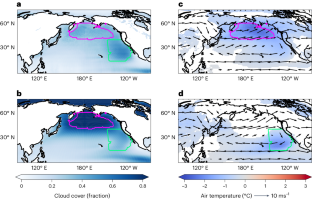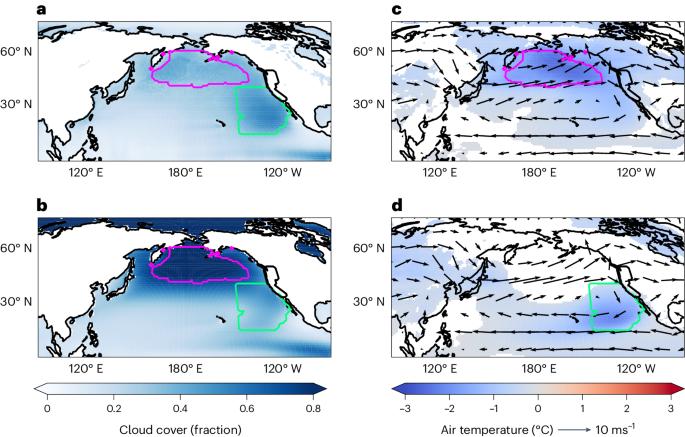在气候变暖的世界里,区域海洋云层增亮的功效会减弱
IF 29.6
1区 地球科学
Q1 ENVIRONMENTAL SCIENCES
引用次数: 0
摘要
海洋云增亮(MCB)是一项旨在降低大气温度和减少气候变化影响的地球工程建议。由于大规模稳定全球平均气温的方法会带来治理方面的挑战,区域性干预措施在近期可能更具吸引力。在此,我们研究了北太平洋区域 MCB 对缓解美国西部极端高温的功效。我们发现,在现今条件下,偏远的中纬度地区或临近的亚热带地区的 MCB 可将夏季危险高温暴露的相对风险分别降低 55% 和 16%。然而,在本世纪中期气候变暖的条件下,同样的干预措施在美国西部和全球范围内却只能减少甚至增加热应力。这种效果的丧失可能是由于大西洋经向翻转环流对人为气候变暖和区域 MCB 的反应与状态有关。我们的研究结果表明,假定在某些条件下有效的干预措施会随着气候的不断变化而继续有效是有风险的。本文章由计算机程序翻译,如有差异,请以英文原文为准。


Diminished efficacy of regional marine cloud brightening in a warmer world
Marine cloud brightening (MCB) is a geoengineering proposal to cool atmospheric temperatures and reduce climate change impacts. As large-scale approaches to stabilize global mean temperatures pose governance challenges, regional interventions may be more attractive near term. Here we investigate the efficacy of regional MCB in the North Pacific to mitigate extreme heat in the Western United States. Under present-day conditions, we find MCB in the remote mid-latitudes or proximate subtropics reduces the relative risk of dangerous summer heat exposure by 55% and 16%, respectively. However, the same interventions under mid-century warming minimally reduce or even increase heat stress in the Western United States and across the world. This loss of efficacy may arise from a state-dependent response of the Atlantic Meridional Overturning Circulation to both anthropogenic warming and regional MCB. Our result demonstrates a risk in assuming that interventions effective under certain conditions will remain effective as the climate continues to change. Regional marine cloud brightening (MCB) has been proposed as a form of geoengineering. Here the authors show that a regional MCB aiming to reduce warming in the Western United States under today’s conditions would be less efficient under warmer conditions and would exaggerate warming in other regions.
求助全文
通过发布文献求助,成功后即可免费获取论文全文。
去求助
来源期刊

Nature Climate Change
ENVIRONMENTAL SCIENCES-METEOROLOGY & ATMOSPHERIC SCIENCES
CiteScore
40.30
自引率
1.60%
发文量
267
审稿时长
4-8 weeks
期刊介绍:
Nature Climate Change is dedicated to addressing the scientific challenge of understanding Earth's changing climate and its societal implications. As a monthly journal, it publishes significant and cutting-edge research on the nature, causes, and impacts of global climate change, as well as its implications for the economy, policy, and the world at large.
The journal publishes original research spanning the natural and social sciences, synthesizing interdisciplinary research to provide a comprehensive understanding of climate change. It upholds the high standards set by all Nature-branded journals, ensuring top-tier original research through a fair and rigorous review process, broad readership access, high standards of copy editing and production, rapid publication, and independence from academic societies and other vested interests.
Nature Climate Change serves as a platform for discussion among experts, publishing opinion, analysis, and review articles. It also features Research Highlights to highlight important developments in the field and original reporting from renowned science journalists in the form of feature articles.
Topics covered in the journal include adaptation, atmospheric science, ecology, economics, energy, impacts and vulnerability, mitigation, oceanography, policy, sociology, and sustainability, among others.
 求助内容:
求助内容: 应助结果提醒方式:
应助结果提醒方式:


